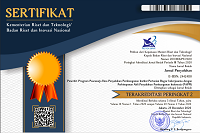Analisis Sikap Pegawai terhadap Perilaku Pelayanan Publik (Studi Kasus di BP2T Kabupaten Sragen dan Kabupaten Sidoarjo)
Abstract
The implementation of Quality Management System (ISO 9001) by BP2T in both Sidoarjo and Sragen Districts has been considered successful in transforming the existing paradigm of service which had been criticized as being irresponsive, untrustworthy, and not oriented toward public interest. The existence of service culture oriented toward public interest has been in doubt due to the prevailing perception that quality culture has not developed within the Government’s bureaucratic environment. This study has aimed at: 1) analyzing the Government employers’ attitudes toward the implementation of ISO 9001: 2) explaining the impacts of the attitudes on the service behaviors among those Government employers who are more responsive toward the public interest. The study shows that there has been a significant positive attitude among the employers toward the implementation of ISO 9001 which has, in turn, positively correlated with their responsive service to the public.
Key words: ISO 9001, employees’ attitudes and behaviors, BP2T, Government employers
Downloads
Authors who publish with this journal agree to the following terms:
- Authors retain copyright and grant the journal right of first publication with the work simultaneously licensed under a

This work is licensed under a Creative Commons Attribution 4.0 International License that allows others to share the work with an acknowledgement of the work's authorship and initial publication in this journal. - Authors are able to enter into separate, additional contractual arrangements for the non-exclusive distribution of the journal's published version of the work (e.g., post it to an institutional repository or publish it in a book), with an acknowledgement of its initial publication in this journal.
- Authors are permitted and encouraged to post their work online (e.g., in institutional repositories or on their website) prior to and during the submission process, as it can lead to productive exchanges, as well as earlier and greater citation of published work (See The Effect of Open Access).















